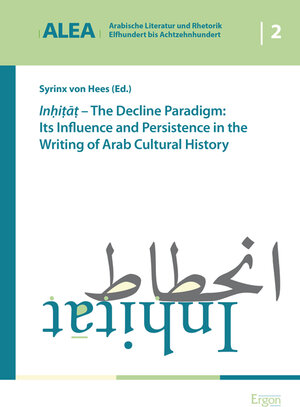Inhitat - The Decline Paradigm: Its Influence and Persistence in the Writing of Arab Cultural History
herausgegeben von Syrinx von HeesAs numerous studies have shown, the European colonial paradigm of writing Arab history, according to which a golden age of greatness was followed by an epoch of stagnation or even decline in the post-Abbasid era, was internalized by the emerging intelligentsia of the na¿¿a to become an integral part of Arab historiography, public discourse, and historical imagination more largely. Although the motives, subjects and specific arguments may vary, a general thematic of decline continues to pervade the relevant literature to this very day.
With contributions by Syrinx von Hees: Inḥiṭāṭ – The Decline Paradigm: Its Influence and Persistence in the Writing of Arab Cultural History. Introduction || Manfred Sing: The Decline of Islam and the Rise of Inḥiṭāṭ: The Discrete Charm of Language Games about Decadence in the 19th and 20th Centuries || Ines Weinrich: The Inḥiṭāṭ Paradigm in Arab Music History || Marek M. Dziekan: Inḥiṭāṭ as a Histori- cal Period in Arab Culture: Traditional Views Versus an Attempt at a New Interpretation || Geert Jan van Gelder: Good Times, Bad Times: Opin- ions on fasād az-zamān, “the Corruption of Time” || Tarif Khalidi: On Progress and Decline in Ibn Khaldūn || Sonja Brentjes: On Four Sciences and Their Audiences in Ayyubid and Mamluk Socie- ties || Syrinx von Hees: Meaning and Function of ʿAjāʾib in Writing on Mamluk Historiography and in Mamluk Historical Writing Itself || Dana Sajdi: New Voices in History: Nouveau Literacy in the 18th-Century Ottoman Levant
With contributions by Syrinx von Hees: Inḥiṭāṭ – The Decline Paradigm: Its Influence and Persistence in the Writing of Arab Cultural History. Introduction || Manfred Sing: The Decline of Islam and the Rise of Inḥiṭāṭ: The Discrete Charm of Language Games about Decadence in the 19th and 20th Centuries || Ines Weinrich: The Inḥiṭāṭ Paradigm in Arab Music History || Marek M. Dziekan: Inḥiṭāṭ as a Histori- cal Period in Arab Culture: Traditional Views Versus an Attempt at a New Interpretation || Geert Jan van Gelder: Good Times, Bad Times: Opin- ions on fasād az-zamān, “the Corruption of Time” || Tarif Khalidi: On Progress and Decline in Ibn Khaldūn || Sonja Brentjes: On Four Sciences and Their Audiences in Ayyubid and Mamluk Socie- ties || Syrinx von Hees: Meaning and Function of ʿAjāʾib in Writing on Mamluk Historiography and in Mamluk Historical Writing Itself || Dana Sajdi: New Voices in History: Nouveau Literacy in the 18th-Century Ottoman Levant






